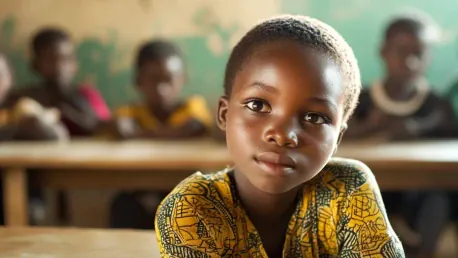Nestled in the Kwahu Afram Plains South District of the Eastern Region of Ghana, Ogbodokope grapples with a host of devastating educational challenges that have persisted over time. The semi-island community is accessible only via the Volta River, and it lacks essential services such as electricity, potable water, and health facilities. The absence of these basic amenities further complicates the already grim situation, making the delivery of quality education a near-impossible feat. These deficiencies include a high teacher deficit, lack of teaching and learning materials, and insufficient furniture, painting a bleak picture for the students and the two teachers striving to provide education under these harsh conditions. Despite the Ghana Education Service’s efforts to establish a formal school to combat child labor and trafficking, the situation remains dire, prompting a desperate plea for comprehensive intervention.
Teacher Deficit and Accommodation Issues
The teacher deficit in Ogbodokope stands as one of the most glaring issues, threatening the very fabric of the educational system. With only two teachers, both former students of the school, the burden is immense. The head teacher, often entangled in administrative tasks, leaves Manasseh Ogbodo Kuma to juggle the entire school’s academic needs single-handedly. The lack of sufficient teaching staff stems mainly from the reluctance of teachers to accept postings to Ogbodokope, primarily due to the inadequate accommodation available. Without suitable living conditions, education professionals are understandably hesitant to relocate to such a challenging environment, exacerbating the already critical shortage of teachers.
In an attempt to address this pressing issue, the community has shown remarkable resilience. Through communal labor, residents constructed a six-unit accommodation block for teachers. However, this endeavor also faces significant obstacles, as the structures are still incomplete, missing essential components like doors and windows. The local Member of Parliament supported the effort by contributing roofing sheets, but the buildings remain unfinished. Currently, these makeshift classrooms serve the community during the day, and tragically, they become shelters for goats at night. The dire state of the accommodation highlights the urgent need for government intervention to ensure that teachers have a decent place to live, thereby attracting more educators willing to work in the community.
Inadequate Learning Facilities and Materials
Equally troubling is the severe lack of teaching and learning materials, which has rendered the educational experience subpar for the students of Ogbodokope. Initially, students were forced to study under trees for over two decades before the mud classroom structures were constructed. Even though these makeshift classrooms now provide some semblance of a learning environment, they are far from adequate. The floors become moist after rainfall, creating an unhealthy setting for students. Additionally, the community’s efforts to build more permanent structures have stalled, as the government has yet to provide the necessary support to complete these projects.
Furniture represents a significant concern, with many students bringing kitchen stools from home to use during lessons. The use of these makeshift seats not only symbolizes the dire lack of resources but also reveals the challenging conditions under which education is being provided. Without basic furniture, maintaining an effective learning atmosphere becomes nearly impossible. The teachers, despite their dedication, struggle to deliver quality education due to the absence of essential teaching aids and materials. This shortage hampers their ability to offer a well-rounded education, forcing them to improvise continually.
Impact on Community and Need for Intervention
The lack of adequate educational facilities and materials not only affects the academic performance of the students but also has broader implications for the entire Ogbodokope community. The assemblyman for the area has voiced these concerns, highlighting the community’s struggles and advocating for better educational and health facilities. Improving educational infrastructure and access to basic healthcare services would significantly enhance the quality of life for the residents of Ogbodokope. As it stands, the community’s ability to break free from the cycle of poverty is hindered by the severe deficiencies in its educational system.
The current state of Ogbodokope’s education system underscores the immediate necessity for comprehensive support from the government and other stakeholders. Addressing these fundamental issues requires a multifaceted approach that involves improving teacher recruitment and retention through better accommodation, providing sufficient teaching and learning materials, and completing the construction of formal school structures. Only by investing in these critical areas can the quality of education be elevated, offering the children of Ogbodokope a chance at a brighter future.
Conclusion
The teacher shortage in Ogbodokope is a severe problem, jeopardizing the entire educational system. With only two teachers, who are both alumni of the school, the challenges are overwhelming. The head teacher often gets caught up in administrative duties, leaving Manasseh Ogbodo Kuma to handle all the academic needs alone. This shortage mainly arises from teachers’ unwillingness to accept postings to Ogbodokope due to insufficient housing. Without adequate living conditions, education professionals are understandably hesitant to move to such a hard-to-live location, worsening the teacher scarcity.
The community has shown tremendous resilience in combating this issue. Through communal efforts, residents built a six-unit accommodation block for teachers. Yet, this project faces hurdles as these structures lack essential components like doors and windows. The local Member of Parliament supported the endeavor by donating roofing sheets, but the buildings are still incomplete. These makeshift classrooms are used during the day and tragically serve as shelters for goats at night. This dire situation emphasizes the urgent need for government intervention to provide decent housing, attracting more teachers to the community.









